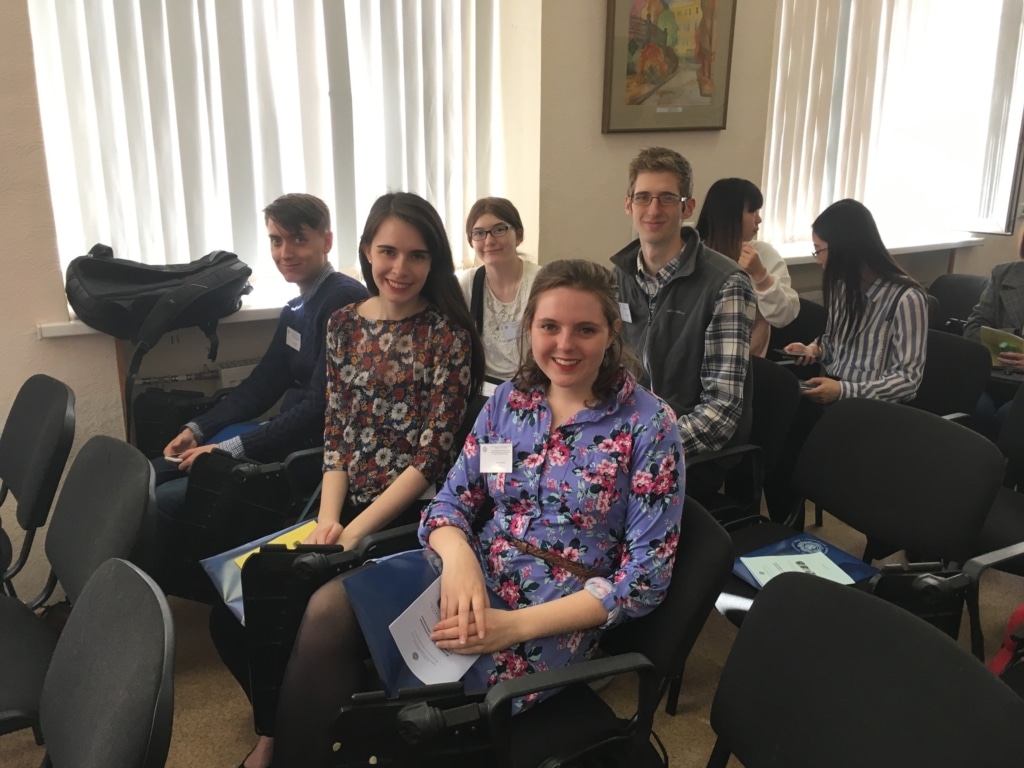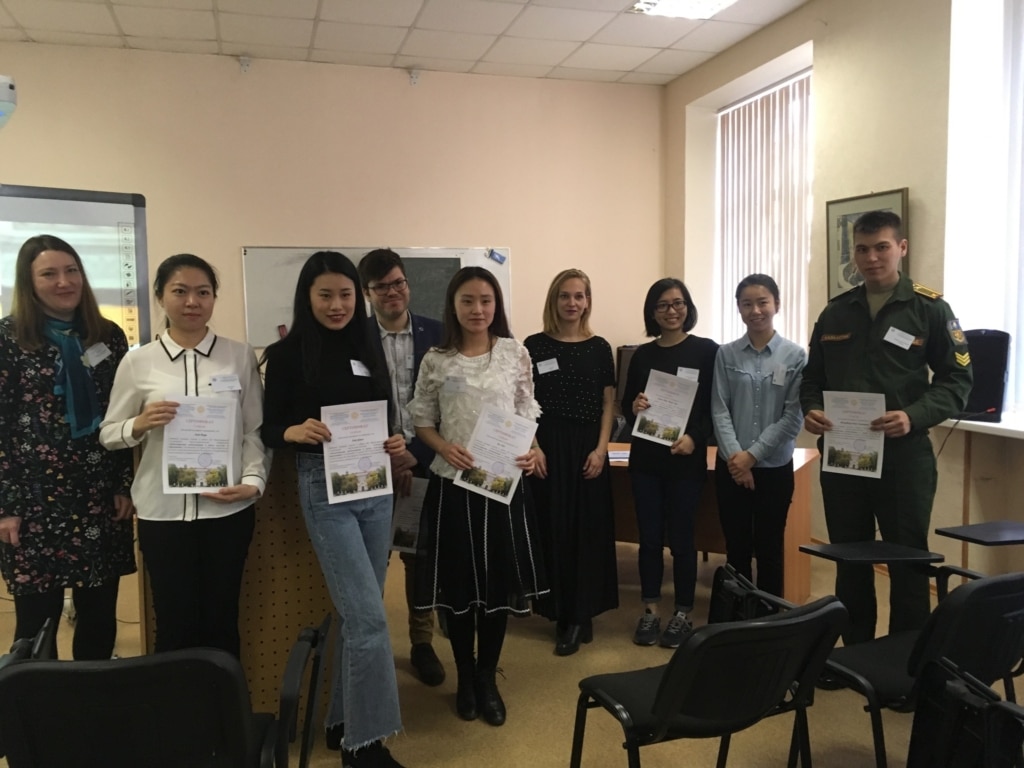Every spring, Herzen State Pedagogical University hosts a conference where international students are challenged with articulating themselves using solely the Russian language for a five to ten minute presentation. Students can choose any topic relating to cross-cultural communication and then collect information through interviews, research, and observations. In addition to the oral presentation, students also produce an article (known in Russian as “доклад”) that will later be published by Herzen in an academic collection from the conference.
Students from SRAS’ St. Petersburg-based programs, which are hosted in cooperation with St Petersburg State University of Economics, have participated in the conference for approximately four years. According to April Djakoniya, SRAS’s Student Manager, the conference “increases its demographic each year” and “is pleased to see more and more SRAS students taking advantage of this unique, scholarly opportunity” This year there were 122 students from 27 different countries including but not limited to: Afghanistan, Nicaragua, France, Angola, America, and Armenia. The common thread that stitched these students together for the day was their study of the Russian language.
Preparing for the conference happens very early for SRAS students studying in St Petersburg. Upon arrival for the spring semester, students are informed of the opportunity and given the chance to decide whether or not they would like to participate. This year, eight students out of thirteen decided to take part.
Intentionally, the SRAS semester-long capstone presentation project in St Petersburg is designed to meet the criteria of the conference and thus students can also use the data they collect towards both ends. Students electing to additionally present at the conference must also write a 3 to 5 page article about their findings for Herzen’s publication.
As SRAS gives their students two months to prepare for the conference, some found the time to research academic writing to discover, and hopefully mimic, the nuances in Russians’ writing style. For example, SRAS student Halla Bearden, a graduate of University of Pennsylvania, said that as part of her preparations she “read a couple of academic articles about teaching methodology,” which she found “was good practice for getting familiar with the formal academic writing register in the Russian language.” The conference, then, gives students a chance to engage with academic styles while also enabling them to hone in on their own unique writing style.

On April 16, 2019, international students prepared to present their articles gathered at Herzen University. The first part of the conference was the plenary session where the organizers introduced themselves and greeted the attending students. After the introductory portion of the conference was over, the organizing committee introduced students that were preselected to present in front of the entire group. After each presentation the other students in the room are invited by the committee to ask questions in Russian.
Halla Bearden was one of the students chosen to present in front of the international students and the organizing committee. Of course, with this honor also comes nerves. In an interview Bearden stated that the morning of the conference she “was feeling nervous.” Once she started presenting, however, she began to “relax into it and it felt normal.” Her topic, English education in Russian schools, stirred many questions amongst the non-native English speaking viewers who were particularly interested in hearing her views on how to better learn English as a second language.
Immediately after she presented, Bearden felt that she had made a huge Russian language accomplishment. She stated that: “I appreciated the opportunity to actually give my presentation at a formal event in front of a fairly large group of people who I didn’t know. I’d given presentations in Russian before, but they’re always been much shorter, much more informal, on less serious topics, and only in front of classmates and teachers in language classes.” Her comments further emphasize the uniqueness of this experience and how invaluable participating in a Russian-language conference in Russia is to gaining experience and confidence. Moreover, according to Bearden this “felt like the first building block toward a resume of my participation in Russian-language academic events.”
After the plenary session, the group divided into smaller groups based on the subject of their research. Then students presented their articles in front of other students in their group. At first this can be scary because every group has students at various levels of Russian language education. For example, SRAS student Jessica Gibson, whose home university is Washington & Jefferson College, said that during the conference she “felt a bit overwhelmed with trying to understand everything” that students presented while also trying to keep a “good mindset” for her presentation.
However, this all changed once Gibson spoke in front of her peers. In an interview she stated that “it was a lot of work to be able to get to a point where I could be successful at the conference mainly because my Russian is not as strong as most people who attended. But the challenge was the best reward. I put lots of hours and effort into being able to do this, now I am able to tell people that I took on such a project in Russia. The main benefit will come from the addition to my confidence that I am seeing really as a whole since coming to Russia.” The experience, then not only heightened Gibson’s academic development but also her personal growth as she prepares to graduate university and enter the workforce.

SRAS student Natasha Harwood, whose home university is University of Montana, found the small group sizes made the event less intimidating than she originally thought it would be. In an interview she said that she was happy she decided to participate in the conference because, like Gibson, “the confidence I gained in my presentation in a foreign language, as well as my knowledge gained during the research process will benefit me most in the future. Conducting interviews, researching, writing, and presenting in Russian were all challenges, but they all increased my confidence in my ability to communicate in Russian.”
For the first time in the conference’s history, the committee decided to allow students to only enter an article rather than requiring them to also present at the conference. Morgan Kaplan, a 20-year-old student studying at University of South Carolina, saw the benefit of the conference but felt she did not have the time to prepare a full presentation, so she decided to only submit an article to be published. In an interview she said that at first “it was difficult to write in a foreign language, but it definitely helped me to see how I know much more than I realized.”
One of the organizers of the annual conference and professors at Herzen University, Alexandra Pavlovna, thinks that all students should participate in the conference no matter their level in the Russian language. According to her, “such academic conferences are necessary for students, since they allow them to show their research, overcome their fear of public speaking, and help prepare students to present serious topics.” It is Pavlovna’s belief that participating in this type of conference is a “completely different and higher level of communication in a foreign language that is rewarding to the speaker and listener.” As evident with the aforementioned student interviews, the students also agree with Pavlovna’s assessment of the conference’s value.
All the SRAS students who took part in the conference agreed on several points. First, that it was very helpful in improving their ability to express themselves in Russian. Further, not only will the experience look good listed on a resume or a CV, but it also helps build the much needed confidence to present in a foreign language. Finally, the opportunity enables students of different cultures and countries to meet and exchange opinions in the Russian language.


